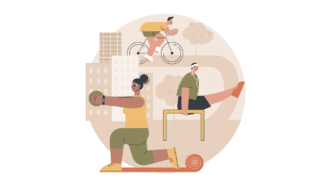LESSON OVERVIEW
The main objectives of this beginner lesson on transport are to:
- discuss transportation to get to different places;
- learn and practise transport-related vocabulary;
- watch a video about Luxembourg testing free public transport.
Students talk about ways of getting around with this lesson. They explore transport vocabulary (e.g. go on foot, take a bus, go by bicycle, etc.), adjectives (cheap, expensive, fast and slow) and revise frequency adverbs (e.g. often, usually, always, etc.). Students also discuss transport people use, talk about how they get to places and watch parts of a video (00:00-00:20 and 01:36-02:16) about public transport in Luxembourg City.
WARM-UP AND VOCABULARY
This beginner lesson on transport starts with a warm-up where students finish sentences about where they live (e.g. My town is…, I live near…, etc.). After that, they read sentences about ways of getting around (e.g. I have a new car so I often drive it to work.). Then, students name types of transport (e.g. bus, tram, on foot, etc.) in pairs of pictures using words from the statements. Afterwards, they create sentences about the types of transport using adjectives (cheap, expensive, fast and slow) or their own ideas. Following that, students complete phrases to talk about transport (e.g. drive a car, ride a bicycle, go on foot, etc.) using the verbs from a previous exercise. Next, they complete a text about transportation habits with the words from the lesson. Students then read short texts and complete sentences about what transport people use.
VIDEO AND DISCUSSION
In this part of this beginner lesson on transport, students choose some places and say how they get there. They use structures with ‘need’ and ‘want’ (e.g. When I want to go to a park, I often drive a car there.) and frequency adverbs (e.g. never, sometimes, often, etc.). Following that, students watch a video about public transport in Luxembourg City. They guess what Luxembourg City’s big problem is. Then, students watch part of the video and check their answers. Afterwards, they watch the second part of the video and choose two opinions about free public transport that are mentioned. They then choose the correct words to complete questions about public transport where they live. After that, students work in pairs and ask each other the questions.
HOMEWORK/REVISION
This lesson plan also includes an additional task that you can use as homework or revision. In the task, students put letters in the correct order to create words. Then, they continue sentences about transport using words from the lesson and their ideas. The task is available in the teacher’s version of the worksheet. You can print it and hand it out to your students. It’s also included in the e-lesson plan.
WORKSHEETS
Subscribe to unlock these and many other Standalone lesson with the Premium plan
Subscribe











Thank you for the lesson! The video was too hard for my Elementary student
Thanks for the feedback! We know that authentic videos can be challenging for Elementary students, so we design the activities around them to make the content as manageable and accessible as possible.